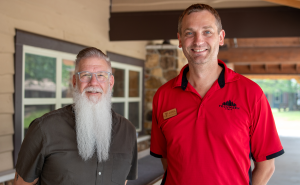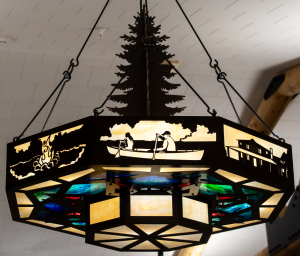Summer camp receives energy efficiency rebates from electric co-op for new dining hall as part of growth
Many Camp Tecumseh visitors for nearly a century munched meals at the camp’s first constructed building. Renovations through the decades expanded the structure for the swelling number of campers each year before the space was finally filled to capacity.

Joe Spear, energy advisor at Carroll White REMC, with Camp Tecumseh CEO Joel Sieplinga on the porch of the new dining hall. The new building includes a 7,000-square-foot patio with chairs and areas for classes for summer camp attendees and visitors to enjoy.
Attendees this summer can stretch while snacking at the camp’s newest – and largest – building.
Camp Tecumseh received $18,660 in Power Moves® rebates from Carroll White REMC, its local electric cooperative, for energy efficient lighting, occupancy sensors and HVAC systems installed as part of the new Kampen Dining Hall. The 26,000-square-foot building opened earlier this year and features a large dining area, kitchen, library and meeting spaces to host large groups and conferences. The dining hall is in River Village, one of two sections of Camp Tecumseh that each feature their own facilities to accommodate kids and adults throughout the year.

Parke County REMC employee Madison Cooper, right, helps a Camp Kilowatt attendee with a hard hat while on a bucket truck. Camp Tecumseh hosts the annual camp sponsored by electric cooperatives throughout Indiana.
“As we started coming up with what we need, it became pretty obvious that this was going to be a pretty big building,” Camp Tecumseh CEO Joel Sieplinga said. “As we plan activities for camp, we figure how do we get people coming together and talk or play games.”
Camp employees started planning Kampen Dining Hall in 2018, though the coronavirus pandemic delayed construction to 2021. The building includes roundtables to facilitate interaction since people face each other, Sieplinga said. The building also features a 7,000-square-foot outdoor porch with rocking chairs, games and areas for classes.
“A lot of the design was about how do we promote community, how do we promote conversation,” Sieplinga said of Kampen Dining Hall, which can seat up to 500 people. “So much of what we do is about bringing people together and having conversations and creating friendships.”

A close-up of the Dees Family Library located in the new Kampen Dining Hall at Camp Tecumseh. The library features books donated by previous camp attendees.
Kampen features 21 custom made light fixtures with LEDs, which shine brighter and use significantly less energy than other kinds of lighting. The fixtures are designed to inspire campers, while the staff wants to teach children about how the building supports the environment through reducing energy.
“We try to look at options to save energy, but as an outdoor and environmental education center, what also can we do to teach kids about them,” Sieplinga said. “It’s great to have environmentally friendly and energy-saving elements in the building, but if we can teach kids more about it, that’s even better.”
Camp Tecumseh worked with Carroll White REMC on the Power Moves rebates, which has become a familiar discussion. The camp received rebates 7 years ago for energy efficiency improvements to new River Village cabins. Camp Tecumseh also previously worked with Carroll White on Power Moves rebates for new barns to relocate maintenance equipment and vehicles from the middle of River Village to a more isolated section of camp property.
“Everything with the Power Moves has been great,” Sieplinga said of his work with Carroll White REMC. “They walked us through things when needed. It really felt like they wanted us to receive this.”

Camp Tecumseh shirts that are available at the store located in Kamden Dining Hall.
“Camp Tecumseh has been an incredible partner in the ways that they serve families and organizations throughout Indiana,” said Cathy Raderstorf, president and CEO of Carroll White REMC. “The Camp Tecumseh staff works tirelessly to provide memorable experiences that last a lifetime. We are happy to be able to support the work of such an incredible gem in our community.”

One of the custom chandeliers in Kampen Dining Hall in Camp Tecumseh’s River Village. The camp received Power Moves® rebates from Carroll White REMC for energy efficiency upgrades to the new facility, including LED lighting.
Kampen’s new location also improved camp safety, Sieplinga said. The original dining hall is next to the camp’s main road; delivery trucks would navigate through busy areas near camp activities. Vehicles take a sideroad to make deliveries to Kampen Dining Hall. During the summer, River Village hosts more than 325 kids in 30 cabins along with 70 employees. Including children who attend day camp and all employees, Camp Tecumseh can host more than 1,000 people daily in the summer.
“Nature itself inspires imagination, if nothing else, and creativity,” said Joe Spear, energy advisor for Carroll White. “That’s how I grew up.”
With Kampen Dining Hall open, camp employees are considering the future for Camp Tecumseh’s original building, which now serves as the main office. Sieplinga hopes that next year, as camp turns 100 years old, the building’s future long-term fate will be known.
“I always tell people something has to happen in that spot because it’s right on the river,” Sieplinga said. “It has the most beautiful view at camp.”